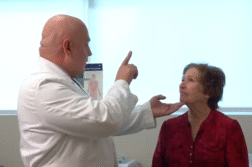PORT ORANGE, Fla. (Ivanhoe Newswire) – An estimated 6.5 million Americans are living with Alzheimer’s disease. There is no cure, and few effective treatments, and the only way to diagnose Alzheimer’s is with an expensive PET scan or a painful lumbar puncture, which measures spinal fluid. Now researchers are testing a new device that may make testing easier and may lead to a diagnosis earlier. RetiSpec
John and Sylvia Whitley play wordle every day. Today, the letters come easily but this couple knows that might not last. Ten years ago, the Whitley’s were caring for Sylvia’s mom with dementia and started noticing changes in themselves.
“Recalling names became more and more difficult over time,” John recalls.
Sylvia remembers, “I saw one of my closest friends. I saw her several times a week and I had no idea what her name was.”
The couple had spinal fluid tests at Emory University. Sylvia had markers for Alzheimer’s, but John did not. But after 58 years of marriage, each knew the other was struggling with memory. They both have had PET scans now. John was eligible for a clinical trial, testing a new way of detecting early signs of Alzheimer’s so, if needed, patients can begin treatment.
The RetiSpec is an investigational device. It’s a special camera that can take 100 layered images of the retina.
Progressive medical researcher, Richard Marshall, PA says, “Then, they have artificial intelligence that reviews those images and can see the buildup of the amyloid plaque on the retina.”
Researchers are testing the RetiSpec’s accuracy. Earlier studies showed RetiSpec was between 80 and 90 percent accurate.
Sylvia expresses, “If there’s anything out there that we can find for us to help other people, we wanna be part of it.”
Although Sylvia Whitley was not eligible for the test of the RetiSpec, she says her doctors are actively searching for other clinical trials in which she could be a participant. The researchers say the ultimate goal, after FDA approval, is to have the RetiSpec cameras installed in eye doctor’s offices, making the technology more widely available.
Contributors to this news report include: Cyndy McGrath, Producer; Kirk Manson, Videographer; Roque Correa, Editor.
To receive a free weekly e-mail on medical breakthroughs from Ivanhoe, sign up at: http://www.ivanhoe.com/ftk
Sources:
https://www.alz.org/alzheimers-dementia/facts-figures
https://www.ncbi.nlm.nih.gov/pmc/articles/PMC4332800/#:~:text=The%20authors%20found%20a%20mean,5
MEDICAL BREAKTHROUGHS
RESEARCH SUMMARY
TOPIC: RETISPEC DETECTS EARLY ALZHEIMER’S?
REPORT: MB #5112
BACKGROUND: Approximately 5.8 million people in the United States age 65 and older have Alzheimer’s disease, eighty percent are 75 years or older and out of the fifty million people worldwide with dementia, between 60 and 70 percent are estimated to have Alzheimer’s disease. There is no known treatment that can cure Alzheimer’s or even alter the brain process of the disease and severe cases cause loss of brain function that can lead to someone not eating or drinking and leading to their death.
(Source: https://www.mayoclinic.org/diseases-conditions/alzheimers-disease/symptoms-causes/syc-20350447)
DIAGNOSING: Alzheimer’s is a brain disease, and it causes a slow decline in memory, thinking and reasoning skills. Some warning signs with memory include memory loss that can disrupt your daily life, difficulty completing familiar tasks, trouble understanding visual images and spatial relationships or even new problems with words in speaking or writing. Some other symptoms of Alzheimer’s include getting lost in familiar places, misplacing possessions or putting them in illogical locations.
(Source: https://www.alz.org/alzheimers-dementia/10_signs https://www.mayoclinic.org/diseases-conditions/alzheimers-disease/symptoms-causes/syc-20350447)
NEW TECHNOLOGY: RetiSpec is developing new technology to detect Alzheimer’s potentially years before any symptoms are even prevalent. While there is no current test that can confirm the actual diagnosis of Alzheimer’s, RetiSpec’s technology uses a device to perform a simple eye scan which is used to identify the presence of disease biomarkers in the eye and this technology also uses hyperspectral imaging techniques and AI-driven algorithmic methods to analyze the biomarker data.
(Source: https://alzheimersnewstoday.com/news/retispec-gentex-developing-technology-detect-early-alzheimers/)
FOR MORE INFORMATION ON THIS REPORT, PLEASE CONTACT:
Scott Stachiowiak
(646) 300-3590
scott.stachowiak@russopartnersllc.com
If this story or any other Ivanhoe story has impacted your life or prompted you or someone you know to seek or change treatments, please let us know by contacting Marjorie Bekaert Thomas at mthomas@ivanhoe.com




